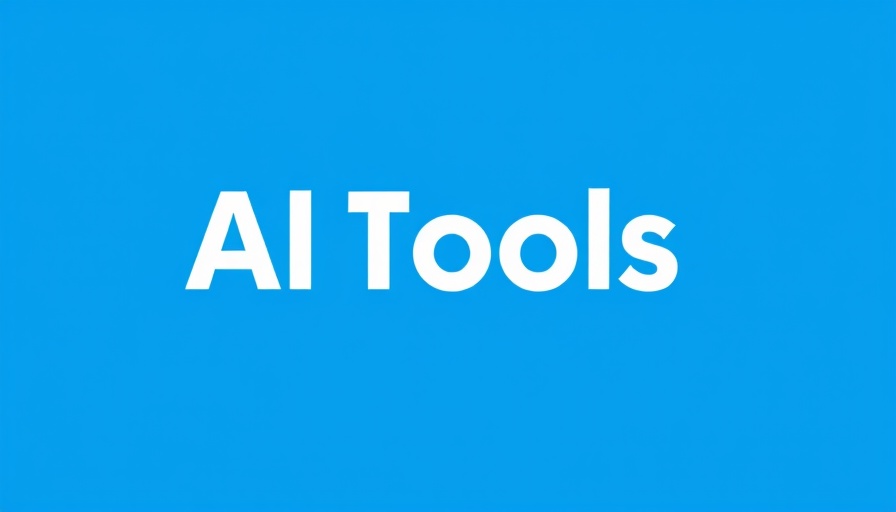
Exploring the Top Alternatives to ChatGPT That Are Worth Your Time
In the vast ocean of artificial intelligence tools, ChatGPT has often floated to the surface, thanks to its impressive capabilities. However, any seasoned user will likely agree that this handy AI can sometimes resemble an overly chatty housemate—helpful, yes, but also prone to long-winded responses that can drown out the insights you're looking for. Whether you are an online marketer trying to optimize your strategies or simply curious about better options, the pursuit of ChatGPT alternatives that truly deliver on functionality is an essential journey worth taking.
Understanding the Limitations of ChatGPT
Though the popularity of ChatGPT is undeniable, it comes with its own set of limitations: generic outputs, context misunderstanding, and occasional hallucinations that can mislead the unwary. Marketers who rely solely on this tool may find its responses lacking in creativity and depth. Hybrid strategies incorporate not just ChatGPT, but other AI tools that could perform better on specific tasks. Let’s discuss some alternative AIs that have been gaining traction and are already challenging ChatGPT’s status.
Criteria for the Perfect AI Alternative
As you explore alternatives, understanding what to consider may make your search more fruitful. Here are some factors to keep in mind:
- Affordable Pricing: Generally, AI tools hover around the $20/month mark, but think about cost per prompt as you navigate options.
- Quality Responses: Look for AIs that offer accuracy and relevance in their content outputs.
- User Experience: A straightforward, user-friendly interface can make all the difference.
- Acceptable Performance: Signs that an alternative surpasses at least one of ChatGPT’s common features will set it apart.
- Privacy Compliance: Ensure alternatives adhere to GDPR and ethical data standards.
Highlighting the Best ChatGPT Alternatives
Here are five noteworthy ChatGPT alternatives, each bringing something unique to the conversation:
- Claude Pro: Offering five times the usage of its free counterpart with about 200 prompts per day, Claude Pro shines in its capability to churn out detailed responses.
- Perplexity Pro: Gifted with a user-friendly interface, Perplexity allows at least 300 searches daily—excellent for marketers and researchers alike.
- Mistral: A leader when it comes to nuanced understanding, Mistral is especially beneficial for data-driven campaigns.
- Copy.ai: This option is particularly tailored for content creators aiming for engagement-centric outputs.
- Jasper: Known for its intuitive creativity tools, Jasper helps marketers stop their daydreaming and start producing high-impact content.
The Shift: Why Businesses Should Consider Making the Switch
As AI continues evolving, marketers must not settle for mediocre. Switching tools can open avenues for creativity, offer more precise insights, and reduce time spent on prompts with snappier, smarter AIs—all of which are vital in this fast-paced digital world.
Future Predictions: How AI Will Reshape Marketing
Advancements in AI will continue transforming marketing strategies. Future tools are likely to integrate not just language functionalities but behavioral insights, better user interfaces, and enhanced intelligence, making them indispensable to marketers.
Emotional Intelligence in AI: Why It Matters
Beyond the industry standards, AI’s emotional intelligence—or its ability to understand and replicate human emotion—will take center stage in crafting content. As digital interactions grow deeper, customers prefer brands that resonate with their emotional needs. That’s where superior AI tools, equipped with emotional data, can make a big difference.
Common Misconceptions About AI Alternatives
People often assume that all AI tools are essentially the same. However, while their core may be similar, the outcomes can vary significantly based on the underlying technology and training data used. As a marketer, differentiating between these tools can keep your content fresh and engaging.
In a world where content is king, choosing the right AI tool can massively impact your marketing success. So, why continue to settle for “okay” when there are tools that can elevate your strategy beyond the ordinary?
 Add Row
Add Row  Add
Add 




Write A Comment